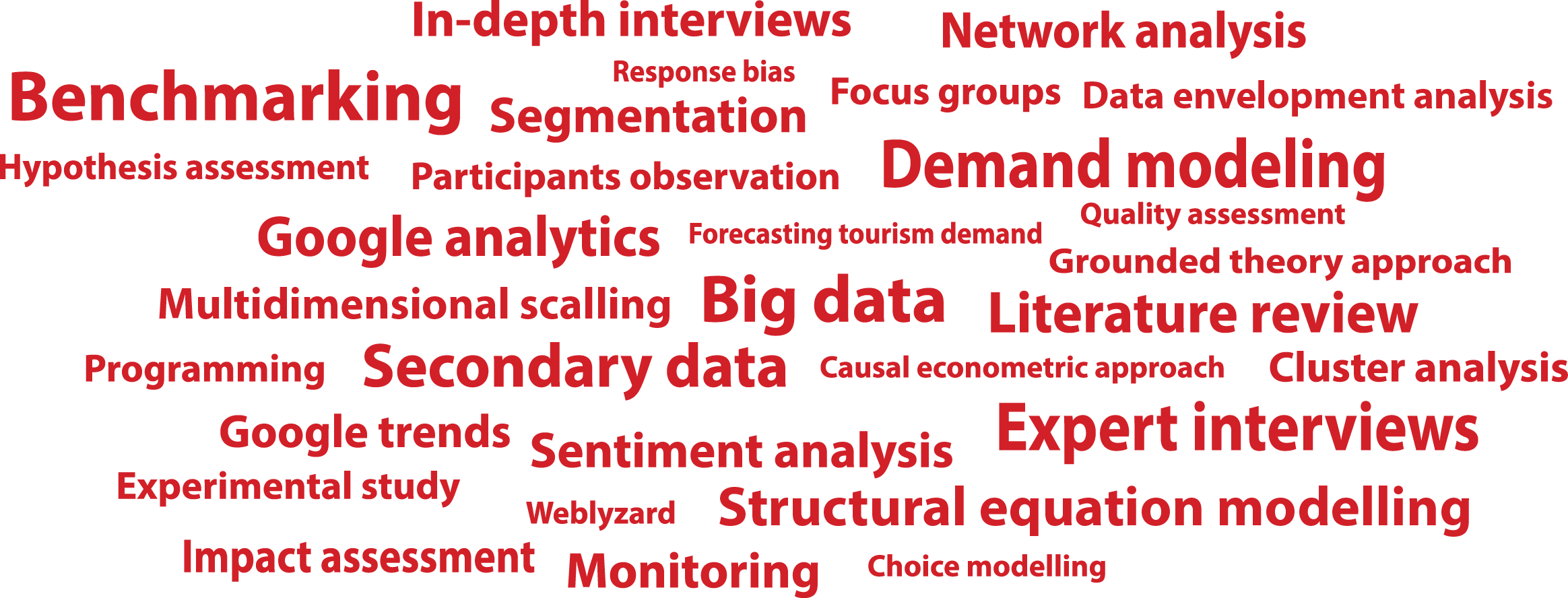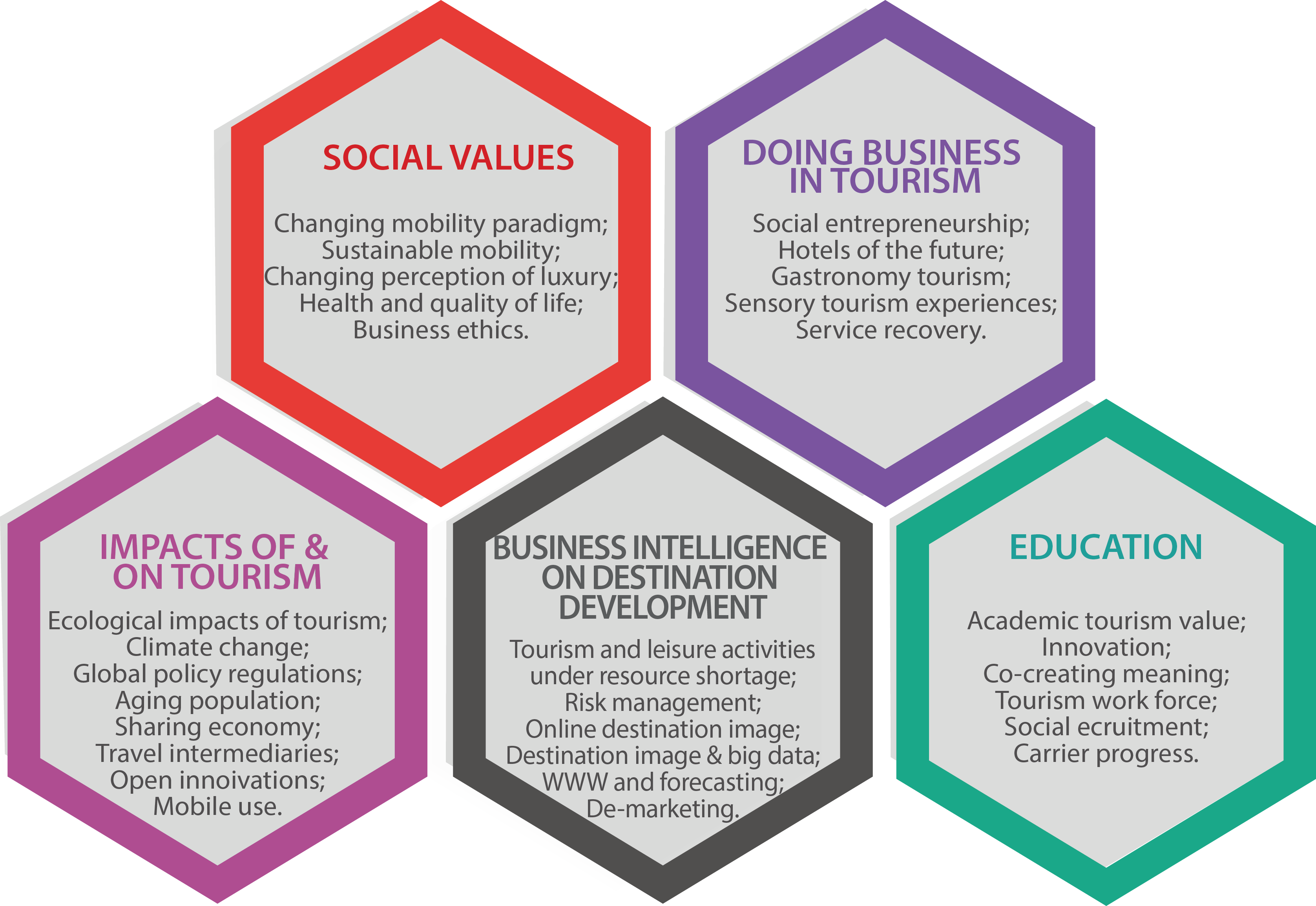Tourism and Service Management
Research Focus
The School of Tourism and Service Management and its faculty engages in a multitude of research areas which are outlined below.

Policy making is an important task as it is a crucial bridge between program design and realization: this process is often very complex as the distinct cross-section character of tourism involves the interests of many different groups. Therefore, the Department of Tourism and Management Service (TSM) observes critically a wide range of policy programs of governments, public institutions and private businesses on a global, national and local level: our experts analyze the settings and the structures of these policy programs as well as their impacts on the economy, society and the natural environment.
In particular, we focus on the impact and the sustainability of the different market interventions intensively and offer solutions for improvements. The quantification of the policy effects is based on impact analysis, one of the department’s core competencies. Further, we evaluate public investment promotions, the efficiency of the marketing budgets of National and Regional Tourism Organizations as well as the impact of taxes and subsidies. As an evaluation base for most of the measures we developed a special data system called the Tourism Marketing Information System (TourMIS). TourMIS is crucial for our tourism analyses and leading engagement in forecasting and gave us a head-start in the academic competition. TourMIS is also widely international accepted and is used by the European Travel Commission (ETC) as well as the UNWTO.

Institutional policy makers as well as managerial decision making requires appropriate assessments of past, current and future demand volumes and patterns. Our faculty is experienced in a variety of disciplines ranging from sociology, psychology, economy, business management, information technology to marketing and statistics. Against this background, we study tourism and leisure demand from different angles applying different tools and techniques. Aggregate analyses are performed using econometric models to study overall travel demand within a regional or national economy. Calibrating efficient statistical models as a reasonable proxy for describing and explaining changes in regional, domestic and international tourism demand is one major area of research activities in this field. These models are the backbone for running forecasts for destinations, attractions and sometimes single businesses as well as for evaluating policy measures and their outcomes. Innovative approaches to tourism demand forecasting incorporate signals from big data providers (e.g. software monitoring Internet activities). Disaggregate, structural or behavioral models for analyzing tourism and leisure demand are the second major area of research activities in this domain. They usually support decision making in a business or destination context. Hence, factors that influence purchase decisions are tested and investigated in detail to assess their impact and consequently give managers directions for effective market place interventions. Upcoming research topics in this respect are for instance incentive and support structures for reducing energy consumption in hotels by their respective guests or expectations of restaurant customers towards sustainable food offers.
A second broader field of research takes a focus on particular consumer experience and business functions. Understanding the consumer’s information behavior in general, electronic word-of-mouth in particular as well as the usage of mobile phones and the effectiveness of website designs becomes increasingly important today. The measurement of destination images and brands through different tools and techniques and their influence on travel decision making represents another area of particular concern. Modelling traveler and visitor experiences offers an additional field of research challenges. Emotional conditions prior to traveling, cultural interactions during the trip, emotional responses after the trip up to the questions of slow travel motivations and of long-term impacts on quality-of-life are only some examples of topics on this research agenda.
A third sub-field particularly crosses over to two of our other research areas: destination development and entrepreneurial challenges. This sub-field is dedicated to detecting new tourism and leisure products (or product bundles) by applying appropriate assessment tools and to developing innovations in tourism, particularly in a collaborative way through social networks.

Increasingly businesses are facing disruptive forces such as financial recession, natural and civil disasters, scarcity of resources and global warming, accelerated pace of technological innovations, globalization and changing consumer demand which puts them into challenging positions to finding ways how to deal with these changes. At the Department of Tourism and Service Management we aim to address these challenges by tackling those forces from a tourism and services business perspective in order to develop a better understanding what is needed for balancing the needs of ‘people, planet and profits’ and for ensuring responsible and sustainable management and operations practices in the tourism industry. The main research fields in this area are:
- Technological advancements, growth in mobile use and increased connectivity have changed the way of communication for businesses and travellers and are drivers for innovations. Research on electronic marketing, eWOM in travel and tourism, evaluating website functionality and measuring website quality, open and user-driven innovation for tourism products and services are core research activities in this area.
- Resource constraints, the impact of climate change and social and economic inequality will affect and threaten the tourism industry if not managed responsibly.
In order to create a better understanding of these threats, the Department of Tourism and Service Management aims to identify these impacts and to develop measurement methods which allow to report these impacts with clear indicators in a transparent way. Special focus within corporate social responsibility is given to the needs of employees and their well-being, business ethics, the emerging concept of social entrepreneurship, impact measurement of social responsibility as well as the evaluation and assessment of sustainable tourist transport systems including forms of slow tourism.


The constantly growing number of travel destinations and the enhanced quality of existing ones is putting great pressure on those responsible for a given destination to find better ways to compete in the tourism marketplace – and to do so in a sustainable manner. At the Department of Tourism and Service Management we are attempting to achieve this goal by better understanding those forces and factors that determine the competitiveness of tourism destinations. In this research field we focus on different economical, environmental, and social aspects of destinations with the goal of improving the strategic decision making of tourism planners. Some of the methods to measure the competitiveness of destinations include benchmarking destinations based on traditional key performance indicators such as arrivals and occupancy rates, but also non-traditional, innovative indicators, such as website metrics of individual destinations, are investigated. As the benefits of definitional systems of destination competitiveness are limited, cause-effect relationships are tested.
At the Department of Tourism and Service Management we investigate these relationships by state-of-the-art analytical techniques, including structural equation modelling and frontier analysis. Our research findings in the field of destination competitiveness and development are published in first-tier tourism journals (Tourism Management, JTR, Tourism Economics, ...).
Our department maintains and works on improving the tourism management information system TourMIS (www.tourmis.info), which is an open access platform for exchanging data, information and knowledge, and is used by all leading tourism organizations in Europe and beyond (e.g. UNWTO). TourMIS provides the tools which allow tourism managers to apply the scientific concepts, methods, and models studied by our faculty.






